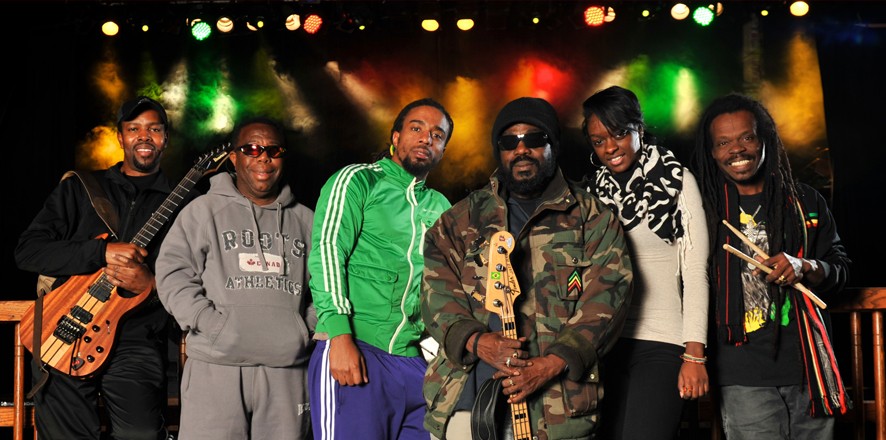Ever since I can remember, I’ve always known who Bob Marley is. I knew all the words to Babylon System before I knew who The Beatles were. So to think that in a couple of minutes I would be speaking to Danglin Anglin, the lead singer of The Wailers, was a bit much to compute. The hour before the interview was scheduled, I phoned my dad and godmother, both massive reggae heads, to let them know; their excited screams down the line were enough to kick me into gear.
The Wailers have existed since 1963, and although their namesake Bunny Wailer is no longer a part of the band, they have undergone numerous changes in their line-up and years of hard grind to maintain the essential Wailers sound. This challenge is made even more complex by the fact that some of the original members (Aston Barrett, Al Anderson, Tyrone Downie and Earl Lindo) have recently taken the current band to court for using the name, as none of the original members remain. Danglin reconciles this in a very thoughtful, righteous, spiritual rasta way: “It’s very important to maintain the sound so we try to stay as close to the tradition as possible, […] and at the same time trying to relate to the more modern generation. To be aware of the evolution of music and how people hear and perceive music.”
As the lead singer, Danglin has very big shoes to fill. Bob Marley sang with the band until his death in 1981; as such, some humility must come with this role. As spokesperson for The Wailers, Danglin is very good at spitting existential truisms on this matter, saying, “You’re just a loop but you’re not the chain.” To expand, he goes on: “It’d be very arrogant of anyone to believe that they could be anywhere close to or as important as the music. What keeps the music alive is the mood and the message; it’s what people are drawn to. So no one will ever be bigger than the message of this music, and once you’re a part of it and you’re under its umbrella, you’ll be under the protection [of] the legacy that the music has gathered over the years.” Reverently, he adds, “You respect the tradition.”
When asked about the development of Caribbean music into more modern styles, such as bashment and dancehall, Danglin becomes philosophical. “Music finds its people; different people like different things. But at the end of the day, you might like certain meals, but when you go to the doctors, [he says] it’ll do your body some good if you have some oatmeal.” Recalling the line from No Woman, No Cry, Danglin expands: “Reggae is like oatmeal, it’s that thing that you need. All those minerals and vitamins – that’s reggae music.”
However, he does concede that the essence of the music has remained the same at its core. “The music and the message is still the same. We still have the same problems and same issues now that we had then. A lot of people are a lot more aware of the origins of these issues that we have.” When asked what problems reggae addresses in the current society, he replies simply and confidently, “Everything – social, economic, racial. Everything that is negative, and then solutions are offered. Unfortunately, […] you find out that propaganda is mostly geared towards confusion. Ultimately we are the solution to every confusion. We can make a difference, if you decide to.”
In the same vein of clarity, precision and education, The Wailers only play Bob Marley’s songs in their live performances in order to “elaborate on the meaning and the message of the songs. What certain things mean and what was the intent of when the songs were originally made, and what the circumstances were. We try to be more involved and [have] more of a narrative now to create a state of clarity. You get caught up in the confusion of propaganda, and you lose the message [of the music]. This is our mission: to bring some clarity to what is already legendary music.”
As such an institution of reggae and, indeed, a kind of representative for the genre, The Wailers attract a huge range of audience members at their live performances. “It’s a great mixture of people: those who are engaged for different reasons. We just try to satisfy each other to their meaning.” And the gigs themselves are geared towards a sense of community in the music: “These performances give Wailers fans an opportunity to gather together. They want to be able to gather together and celebrate the songs that they know, that they love. Perfect strangers gather together and get a chance to just share in a common goal. It’s [about] taking them to that place of relief, really, to try and give them hope, and give them a feeling of encouragement.”
Danglin’s pure love of the music is so evident from his struggle to pick his favourite song to play live. “That’s hard to say. You would ask “what is your favourite meal?’ but really what is it that your body needs? The great thing about this music is that it supplies different needs, it’s all positives. It takes you to a positive place, a revolutionary place.”
The Wailers are the most long-standing reggae band from the original surge in the 1970s. To have survived this long, even in different reincarnations, is a testament to the passion which they inspire through their music and which they clearly put into it. The purity and simplicity of their message is enough to carry them through for decades to come.
Jemima Skala

